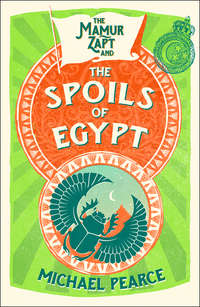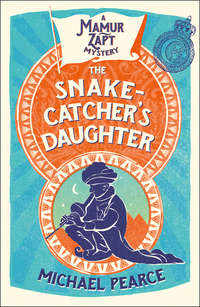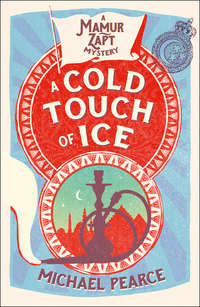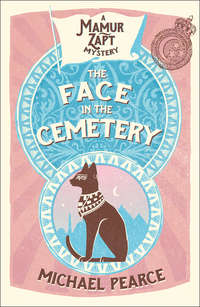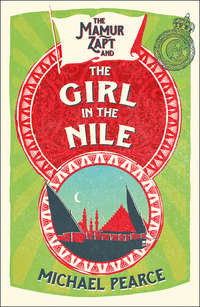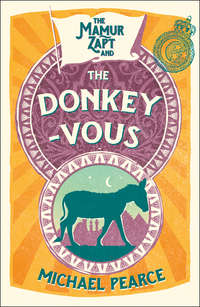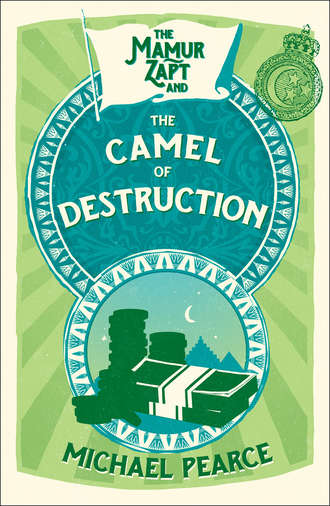
Полная версия
The Mamur Zapt and the Camel of Destruction
‘Moved. Out of the Ministry altogether. Somewhere else. Into the street, perhaps. Or at any rate another Ministry. Public Works, perhaps.’
‘Finance?’
‘Yes. No, on second thoughts. The follow-up could be, well, unfortunate. No, no. Public Works would be better.’
‘Well, yes, but–’
‘You will? Oh, thank you.’
‘An apéritif, perhaps?’
He had met them, as they had suggested, in the bar at the Hotel Continentale. There was an Egyptian, who must be Abdul Khalil, a Greek, Zokosis, presumably, and someone harder to place but definitely a Levantine of sorts, who would be Kifouri.
The waiter brought the drinks: sweet Cyprus wine for Zokosis and Kifouri, a dry sherry for Owen and coffee for Abdul Khalil.
‘As I mentioned over the phone, Captain Owen, we’re businessmen who have quite a lot of dealings with Government Departments. I think you’ll find that Mr Stephens would be prepared to vouch for us–’ Stephens was the Adviser at the Ministry of Finance– ‘and I think it is a mark of our standing that the Minister invited us to join the Board. I mention this so that you will know we are bona fide and also that we are not the sort of men who would want to waste the time of a busy man like yourself.’
Owen bowed acknowledgement.
‘In any case, our concern is, what shall I say, marginal, peripheral, which is why we thought it best to meet informally rather than call on you at your office.’
Owen muttered something suitably non-committal.
‘You are, we understand, taking an interest in a recent sad case of suicide. A man in one of the Departments.’
‘Yes.’
‘Well, now, we naturally wouldn’t wish to interfere in any way, believe me, in any way, with your conduct of the investigation – that would be quite improper – and our interest is, as I have said, marginal. However, we knew Mr Fingari and quite recently have been having a number of dealings with him–’
‘Dealings?’
‘A businessman’s way of talking. Conversations, rather. Yes, conversations. Mr Fingari, you see, represented the Ministry on the Board. And naturally, in view of recent developments–’
‘Yes, recent developments,’ echoed the others.
‘That, actually, is why we wanted to have an informal word with you. You see, negotiations are at a critical stage–’
‘And it’s important to carry the community with us. The business community, that is.’
‘And with confidence so low–’
‘It is really a very inopportune moment for him to die.’
‘Most difficult.’
‘Now if only he could have died a day or two later–’
‘You don’t think that could be arranged by any chance, Captain Owen? After all, it makes no real difference. He’s dead anyway, isn’t he?’
‘The family–’ Owen began.
‘Leave that to us. I’m sure that could be arranged. We’ll talk to them, Captain Owen.’
‘But–’
‘Look at it like this; it’s actually giving the poor chap a few extra days of life. Don’t be hard-hearted, Captain Owen. Don’t deny him that! Think of the poor fellow, think of his family–’
‘You want me to alter the date of his death?’
‘Well, that would be most kind of you, Captain Owen. Most kind.’
‘It’s the family, you see.’
‘Distressed, naturally.’
‘It is a very respectable family,’ said Ali Hazurat earnestly. ‘Otherwise Mr Hemdi would not wish his daughter to marry into it.’
‘But–’
‘The arrangements were all made. The wedding contract was about to be signed. My nephew was looking forward–’
‘A dowry?’
‘Considerable. It was a great opportunity for my nephew. And now, alas–’
‘But surely the wedding can go ahead? After a suitable period, of course. Your nephew was not that closely related to Osman Fingari.’
‘It reflects on the family, you see. It’s making Mr Hemdi think again.’
‘Well, I’m sorry about that, but–’
‘It’s the shame, you see. Suicide! No one will want to marry into a family with suicides.’
‘I’m afraid I really don’t see what I can do–’
‘Couldn’t you,’ pleaded Ali Hazwat, ‘just call it something else? An accident, perhaps?’
‘He took prussic acid.’
‘By mistake! Couldn’t it be by mistake? He thought it was something else. The wrong bottle–’
‘Well, at least there’s going to be no doubt about the circumstances,’ said Paul.
‘No?’
CHAPTER 2
‘Alone? Certainly not!’ Mr Istaq was shocked.
‘I do not wish to trouble Mr Fingari, you see.’
‘Well, no, there’s been enough trouble as it is.’
‘And he’s very frail, so I thought–’
‘Well, yes, but – alone! What can you be thinking of, effendi? She is a decent Muslim girl.’
‘It was just that in the circumstances–’
‘Why do you want to see her, anyway, effendi? What can a woman know? Why not ask me? I will do what I can to help you.’
‘Well, thank you, it is very kind of you, Mr Istaq. But then, you see, you would not be able to help me in quite the same way. After all, though a relative, you did not actually live in the house and therefore would not know–’
‘Yes, but alone! With a man! No, really, effendi–’
Mr Istaq, hot, bothered and worried in equal proportions, took some time to be persuaded. He was, when all was said and done, the relative who had shown Owen the body and felt that he bore some responsibility for the consequences.
But then, he was also the closest and most senior male relative and, given old Mr Fingari’s frailty, it all devolved on him anyway. He was a simple journeyman tailor and all this was a bit much for him.
He knew, however, what was proper. And it was not proper to let his niece talk to strange men. Aisha was inclined to be headstrong, anyway. His brother had always given her too much scope. That was all very well, things were not, perhaps, what they used to be, but who would want to marry a woman used to having her own way? And it was likely to be him, Istaq, who would be left with the problem of marrying her off.
In the end a compromise was reached. Owen was allowed to interview her but in Mr Istaq’s presence.
Owen had always known this was the most likely outcome. It was customary in Egypt for female witnesses to be interviewed through their father or husband or a near male relative. He had, however, hoped to avoid it in this case.
The girl appeared, heavily veiled and dressed from head to foot in decent, shapeless black. All that could be seen of her was her eyes, which were suitably cast down.
‘Miss Fingari, I am sorry to trouble you further in such sad circumstances but there are one or two things I would like to ask you.’
The girl moved slightly and Mr Istaq cleared his throat.
‘You saw your brother every day, of course?’
Mr Istaq looked at Aisha, hesitated and then reluctantly admitted that this was so.
‘Had you noticed a change of spirits in him lately?’
‘No,’ said Mr Istaq confidently.
‘Had he seemed at all worried?’
‘No.’
‘Perhaps a little depressed occasionally?’
‘No.’
The girl had not yet spoken.
‘I ask,’ said Owen, ‘because I am wondering what could have brought him to this sad state of mind?’
He put it as a question and then waited, looking inquiringly directly at the girl.
She did not reply. Mr Istaq, not quite sure how to respond, muttered uncertainly: ‘No sad state’.
‘Had he ever talked to you about problems at work?’
‘Certainly not!’ said Mr Istaq, shocked.
‘Or problems not at work. Not at home, of course, but in his private life?’
‘No,’ said Mr Istaq firmly.
‘I wonder,’ said Owen, ‘if there had been any changes lately in his way of life?’
‘No,’ said Mr Istaq.
‘But that is not true, Miss Fingari,’ said Owen, still addressing himself to the girl although she had not yet spoken. ‘Everyone knows that there had been changes in his way of life. He had had a lot done to the house, for a start.’
‘No changes!’ snapped Mr Istaq, caught off balance.
‘But there had been!’ said Owen, wide-eyed. ‘The man-dar’ah – new marble! And I think the better of him for it. So often people rise in the world and forget their family. But was Osman Fingari like that?’
‘No,’ said the girl firmly.
‘No,’ echoed Mr Istaq.
‘Everyone says he loved his parents.’
‘He did,’ said the girl.
‘He did,’ said Mr Istaq.
‘But they were old, Miss Fingari, and he would not have wanted to trouble them. So did he discuss his problems with you, I wonder?’
‘No,’ said Mr Istaq.
The girl said nothing. Her eyes, though, were now raised and she was looking at Owen directly.
‘You see, when men are brought to such a desperate pass, when they are in a state so desperate that they can contemplate a thing like this, it is often because they feel themselves quite alone. Did Osman Fingari feel himself so alone, I ask myself.’
The girl’s eyes filled with tears.
‘Was there no one he could turn to? No one in the whole wide world?’
‘Why do you ask these things,’ the girl suddenly burst out. ‘What business is it of yours? What do you care about my brother?’
‘Aisha!’ cried Mr Istaq, scandalized. ‘Be quiet, girl! You have said enough, more than enough!’
Things were worse even than he had feared. The girl had no idea how to behave.
‘You do not address your elders like that!’
The girl dissolved in a flood of tears.
Both men were at a loss.
‘Now, now!’ said Mr Istaq, chiding but at bottom kind-hearted. He had overdone it. The girl wasn’t used to being corrected. ‘It’s all right! I think we had better stop,’ he said to Owen.
‘Of course!’ Owen could have kicked himself. ‘I am sorry, Miss Fingari. I have no wish to distress you. I have to ask these things. You see, sometimes it is something inside a person that makes them do a thing like this and sometimes it is something outside–’
‘I think we had better stop,’ said Mr Istaq.
Owen, dissatisfied with himself, stopped for a coffee round the corner. He was sitting at a table sipping it when a small boy touched him on the arm. Automatically he felt in his pocket.
‘No, no, effendi!’ protested the small boy. ‘Not that! At least, not just that. Perhaps afterwards – when you have heard my message.’
‘You have a message for me?’
‘Yes, effendi, though I must say, I’m a bit surprised at it, because she’s not been that way before.’
‘Just a minute,’ said Owen. ‘Who sent you?’
‘Aisha.’
‘Miss Fingari?’
‘That’s right. Only we call her Aisha.’
‘What’s the message?’
The little boy reflected. ‘I ought to bargain with you–’
‘Twenty milliemes?’
‘Say, twenty-five.’
‘Twenty-five it is.’
‘Right, then. She wants to see you. Not with her uncle.’
‘Does she say where?’
‘She does. But, effendi, she does not know much about this sort of thing and I do not think that what she proposes is a good idea. She says she will go to the souk and you can meet her on the way. But, effendi, that is not the way to do it.’
‘What is the way to do it?’
‘For that, effendi, I would need the full half piastre.’
‘A fee which fits your talents. For a suitable place no doubt I could find such a sum, exorbitant though it be.’
‘In this world one has to strike hard bargains,’ said the small boy sententiously.
‘Yes, indeed. What do you suggest?’
‘There is a ruined house nearby–’
‘Is it decent enough for Miss Fingari?’
Places like that were used as lavatories.
‘No, but there is a doorway where you would not be seen. It is not very comfortable for your purpose–’
‘My purpose is only conversation.’
‘Well, of course, it’s early days yet–’
The boy led him to the spot. It was a place where two or three tenement buildings had crumbled down together. This was not unusual in Cairo. Houses were often made of sun-dried mud brick and in the rains sometimes dissolved.
The boy picked a way through the rubble, squeezed through a gap between two crumbling walls and brought Owen to an archway set deep below ground level in what remained of the side of a building. It had, perhaps, once led into a cellar.
‘Wait there!’ he said.
A few moments later, Aisha’s veiled form appeared in the gap and stood before the archway uncertainly.
‘Miss Fingari–’
‘I shouldn’t have come here like this. Ali is horrible. Go away, Ali! Mind you go right away! It’s not what you think.’
She came forward determinedly and stepped into the archway.
‘I shouldn’t be doing this. But I had to see you.’
‘It is about Osman?’
‘Yes.’
Under the archway it was dark. Instinctively, she retreated deeper into the shadow. He could not see her eyes but he could tell from the position of her body that she was looking up at him.
‘You hurt me,’ she said, a little shakily, ‘when you said he felt alone.’
‘I don’t know that. It was just–’
‘It was true. Oh, it was true. It must have been true. I tried! But–’
‘You must not blame yourself, Miss Fingari. It is not always possible to break through.’
‘No,’ she said. ‘I should have tried harder. I became impatient. When he came home–’ She broke off.
‘When he came home–?’
‘Sometimes he had been drinking. Oh, it’s not such a great fault, I see that now; but it was so different, so – so unexpected. He had always been – he had always behaved properly–’
‘He was a strict Moslem?’
‘Not strict, but – but he did what he should. Until–’
‘Recently?’
‘Yes.’
‘You saw a change in him?’
‘Yes.’
‘What sort of change, Miss Fingari?’
‘He became – not disorderly, but not so ordered. He would come home late. He never used to do that. Now he did it often. He wouldn’t say where he had been–’
‘You asked him?’
‘Yes. We were close. We had been close. He would talk to me when he wouldn’t – He didn’t always feel he could – talk to my parents.’
‘What did he talk about, Miss Fingari?’
‘Oh, nothing much. This goes back a long time. To when he was at school. If something had gone wrong during the day, if someone had been unkind to him, he would run home and pour it all out to me. I was his big sister and – and I remained so even after he started work.’
‘He still talked to you?’
‘Yes. Perhaps even more so. Our parents were growing older. They did not always understand the sort of things he was doing at work–’
‘But you did?’
‘No!’ She laughed. ‘How could I? A woman? Shut up in the house all day. All I knew was the family and the souk. But I had friends, other girls, and they talked about their brothers and I – I learned something, I suppose. Anyway, he felt he could talk to me.’
‘And then he stopped talking to you? When was this?’
‘It was not – not suddenly, not like that. It just – built up over time.’
‘But when did it start? When did you first become aware that you could not talk to him as you used to?’
‘I – I don’t know. Recently. The last few months.’
‘Since he joined the Board?’
‘No. Yes, I suppose,’ she said, surprised. ‘But, effendi, he was not like that. It was not because he became proud. Oh, he was proud of being appointed to the Board, he was very proud of it – and so were we all – but it wasn’t – that wasn’t the reason.’
‘He did change, though?’
‘Not because of that.’
‘Why are you so sure?’
‘Because I know him. And – and because he did talk to me about that, about the people he met – they were very famous people, effendi, even I had heard of them – about the places he used to go to. No, it was not that, it was – afterwards.’
‘Afterwards?’
‘About the time he started coming home later.’
‘That was some time after he had joined the Board?’
‘Yes.’
‘Have you any idea, Miss Fingari, why that was? Why did he start coming home late?’
‘He – he was meeting someone. I – I thought it was a woman and teased him. But it wasn’t. He said it wasn’t. And then–’
‘Yes?’
‘That was when he started to come home smelling of drink. I knew then that it was not a woman, that it was someone who was bad for him. I was angry with him, I told him he must not see them, but he said – he said he had to see them–’
‘Had to?’
‘Yes. He said it was business and I said what sort of business was it if it was in the evening and he came home smelling of drink after it and he became angry and said I did not understand. And after that he would not speak with me.’
She began to sob.
‘If I had not been so fierce, perhaps he would have spoken to me. Perhaps I would have been able to help him, save him–’
‘You must not blame yourself, Miss Fingari.’
‘But I do blame myself!’ she said, sobbing. ‘I do blame myself. You were right when you spoke of him being alone. He was alone, and he would not have been if I–’
‘You did what you could, Miss Fingari.’
‘No, not what I could!’
There was a little spasm of sobbing in the shadows. He moved towards her uncertainly, intending to comfort her, but then she stepped forward herself and seized him by the arms.
‘But if I am to blame,’ she hissed, ‘so are they! They brought him to this! You said there was something outside himself. Someone. There was!’
‘Miss Fingari, these may just have been friends–’
‘No. He was different after he had been with them. He began to be different all the time. There was a change, oh yes, there was a change!’
‘You said he was more lax in his behaviour–’
‘No, not lax. Not just lax. Different. They were bad men, Owen effendi. They changed him. He had always been a good man, a good son, a good brother …’
She began to weep steadily.
‘Effendi, you are too rough with her,’ said a voice from outside the archway. ‘Didn’t I tell you she doesn’t know about this sort of thing?’
The sobbing stopped abruptly. There was a sharp intake of breath.
‘Ali, you are disgusting!’ said Aisha, and stalked out into the sunlight.
‘First, it was the kuttub. Then it was the hospital. Then it was the Place for Old People. I tell you, they’re determined to get you one way or another. Next thing, it will be the cemetery!’
‘Next thing it will be the mosque. That comes before the cemetery.’
‘It already is the mosque. Have you talked to Sayid ben Ali Abd’al Shaward lately?’
‘Not him too! I tell you, they’re determined to get us one way or another. The little we’ve got, they want to take away! That’s how it always is for the poor man.’
A general mutter of agreement ran round the circle squatting round the barber’s chair.
‘Abd el-Rahim is not a poor man!’ someone objected.
‘I’m not talking about Abd el-Rahim,’ said the barber, flourishing his scissors. ‘I’m talking about us!’
‘Watch it!’ said the man in the chair, flinching as the blades flashed past his ear.
The barber ignored him and turned to address the assembly.
‘Don’t you see? We’re the ones who are going to lose out. They’ll take the kuttub away. Well, you’ll say, I don’t mind that; my children are grown up. But then, what about the hospital? What about the Place for Old People? You will mind that one day!’
‘What about the mosque?’ muttered someone.
‘You can always go to another one,’ said someone else.
‘Yes, but that’s my point,’ said the barber. ‘You can always go to another one. Your children can go to another kuttub, you can drag your aching bones to another hospital or your old bones to another Place for Old People, but they’ll be somewhere else!’
‘Are you going to cut my hair or not?’ asked the man in the chair.
The barber turned back to him hurriedly.
‘What will become of the neighbourhood,’ he asked over his shoulder, ‘if they take all our amenities away?’
‘It’s going downhill anyway,’ said someone. ‘It’s been going downhill ever since those Sudanis moved in.’
‘It will go downhill a lot faster if there isn’t a kuttub and a hospital,’ said the barber, declining to be diverted. The Sudanis were customers of his.
‘The Shawquats have always had that kuttub,’ said someone ruminatively.
‘And done very well out of it,’ said someone else sceptically.
‘Yes, but it’s terrible to take it away just when they need it, now that the old man’s died.’
‘They’ve still got a piastre or two, I’ll bet. I shan’t be shedding any tears for them.’
‘It still doesn’t seem right. They’ve always had it.’
The barber swung round excitedly.
‘We’ve always had it. The waqfs were set up to benefit us. And now they’re being taken away. All right, the Shawquats have done well out of it, and so has Sayid ben Ali Abd’al Shawad; but we’re the ones who are going to lose!’
‘He’s cut me!’ shouted the man in the chair.
‘It’s nothing! Just a scratch!’
‘I’m bleeding!’
‘He moved! Didn’t he move?’ the barber appealed to the crowd.
‘I didn’t move! I haven’t moved at all!’
‘My God, he’s dead!’ said a caustic voice from the back of the crowd.
Owen eased himself out of the circle. With his dark Welsh colouring and in a tarboosh he looked like any other Levantine effendi: a clerk, perhaps, in the Ministry of Agriculture.
‘It’s a bit of the Camels, old boy,’ said Barclay, of Public Works, that evening at the club.
‘Camels?’ said Owen, bewildered. So far as he had been aware, they had been talking about the destructiveness of road development in an urban environment.
‘Well, Camel at least. Have you heard of the Camel of Destruction? No? It’s a figure from legend, a sort of Apocalyptic Beast. At the beginning of the world, or soon thereafter, it ran amok and threatened to destroy everything. And if you’ve ever seen a camel going wild among a lot of tents you’ll know that that means everything, but everything!’
‘We’ve got past the tent stage now, Barclay,’ said someone superciliously.
‘Yes, but we haven’t done away with the Camel of Destruction,’ said Barclay. ‘Oh no, my goodness we haven’t. Just look around you! Beautiful buildings being pulled down, monsters being put up.’
‘I’d assumed that was all your doing, Barclay,’ said the supercilious one. ‘You’re responsible for planning, aren’t you?’
‘I may be responsible,’ said Barclay, ‘but there’s nothing I can do about it.’
‘In Cairo,’ said someone else, ‘money is the only thing that talks.’
‘Well, of course, it’s a complete racket,’ said Barclay.
‘They have to submit plans but then if we turn them down, they can proceed all the same. There’s nothing we can do.’
‘Don’t you have to give planning permission?’
‘No. Take the Hotel Vista, for instance. You’ve seen that big block on the corner of the Sharia El Mustaquat? They sent us the plans. Anyone with half an eye could see they wouldn’t do. The foundations were unstable, the retaining walls – well! We condemned it on grounds of public safety. The next thing we heard, it was going straight ahead.’
There was a general shaking of heads.
‘Mud for mortar. No wonder they come down as fast as they go up!’
‘And there are still plenty going up!’
‘Not as many as there were.’
In the boom of recent years a frenzy of building had overtaken the city. Rows of houses were pulled down; great blocks were run up. And then, when they were only half way up, and neither up nor down, the money had run out. With the general tightening of credit, projects were abandoned all over Cairo, leaving the city looking like one huge derelict building site.


